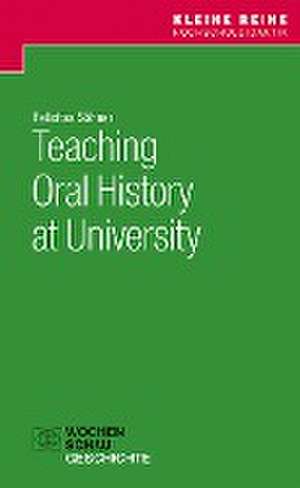Teaching Oral History at University
Autor Felicitas Söhneren Limba Engleză Paperback – 5 apr 2022
Preț: 77.36 lei
Nou
Puncte Express: 116
Preț estimativ în valută:
14.80€ • 15.50$ • 12.25£
14.80€ • 15.50$ • 12.25£
Carte disponibilă
Livrare economică 11-17 martie
Livrare express 04-08 martie pentru 16.69 lei
Preluare comenzi: 021 569.72.76
Specificații
ISBN-13: 9783734413889
ISBN-10: 3734413885
Pagini: 51
Dimensiuni: 111 x 182 x 4 mm
Greutate: 0.06 kg
Editura: Wochenschau Verlag
ISBN-10: 3734413885
Pagini: 51
Dimensiuni: 111 x 182 x 4 mm
Greutate: 0.06 kg
Editura: Wochenschau Verlag
Notă biografică
PD Dr Felicitas Söhner is a research associate at the Centre for Health and Society at Heinrich Heine University Düsseldorf. She works in research and teaching at the Department of History, Theory and Ethics of Medicine. Main areas of work: Oral history, medical and social history of the 20th and 21st centuries, European culture of memory and its biographical treatment.
Cuprins
1. Introduction 2. Location 2.1 Definition of oral history 2.2 Aims: from preliminary concepts to historical consciousness 2.3 Competences, methods, teaching formats 3. Conceptual foundations and starting points 3.1 Oral tradition of our time 3.2 Memory, remembrance and witnessing 3.3 Research interest and epistemological value 3.4 Legal and ethical aspects 4. Oral history practice 4.1 Preparing for the interviews 4.2 Conducting the interviews 4.3 Follow-up and writing up of the interviews 4.4 Analysis of the interviews 4.5 Challenges in the evaluation process 4.6 Archiving the documents 4.7 Secondary analysis 5. Concluding remarks 6. Resources 6.1 Index of oral history collections 6.2 Bibliography
